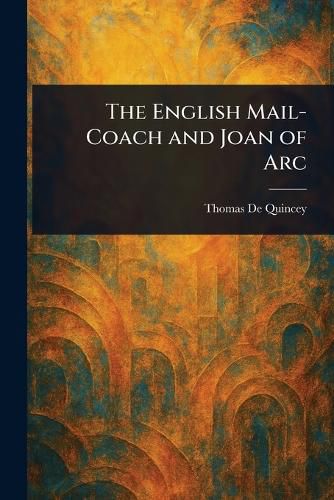Readings Newsletter
Become a Readings Member to make your shopping experience even easier.
Sign in or sign up for free!
You’re not far away from qualifying for FREE standard shipping within Australia
You’ve qualified for FREE standard shipping within Australia
The cart is loading…






This title is printed to order. This book may have been self-published. If so, we cannot guarantee the quality of the content. In the main most books will have gone through the editing process however some may not. We therefore suggest that you be aware of this before ordering this book. If in doubt check either the author or publisher’s details as we are unable to accept any returns unless they are faulty. Please contact us if you have any questions.
Experience two powerful historical essays from the brilliant mind of Thomas de Quincey. "The English Mail-Coach" delves into the symbolic power and societal impact of the mail coach system in England, examining its role in connecting communities and shaping the national landscape. De Quincey masterfully weaves historical context with vivid descriptions and evocative prose, exploring the importance of communication and progress.
Paired with this essay is a profound exploration of the life and legacy of "Joan of Arc." This historical essay offers a compelling portrait of the iconic French heroine, capturing her courage, conviction, and ultimate sacrifice. De Quincey's insightful analysis sheds light on Joan's enduring influence and her place in history.
These essays, known for their rich language and insightful observations, offer a glimpse into the past, exploring themes of history, society, and the human spirit. A timeless collection perfect for history enthusiasts and lovers of classic literature.
This work has been selected by scholars as being culturally important, and is part of the knowledge base of civilization as we know it.
This work is in the public domain in the United States of America, and possibly other nations. Within the United States, you may freely copy and distribute this work, as no entity (individual or corporate) has a copyright on the body of the work.
Scholars believe, and we concur, that this work is important enough to be preserved, reproduced, and made generally available to the public. We appreciate your support of the preservation process, and thank you for being an important part of keeping this knowledge alive and relevant.
$9.00 standard shipping within Australia
FREE standard shipping within Australia for orders over $100.00
Express & International shipping calculated at checkout
This title is printed to order. This book may have been self-published. If so, we cannot guarantee the quality of the content. In the main most books will have gone through the editing process however some may not. We therefore suggest that you be aware of this before ordering this book. If in doubt check either the author or publisher’s details as we are unable to accept any returns unless they are faulty. Please contact us if you have any questions.
Experience two powerful historical essays from the brilliant mind of Thomas de Quincey. "The English Mail-Coach" delves into the symbolic power and societal impact of the mail coach system in England, examining its role in connecting communities and shaping the national landscape. De Quincey masterfully weaves historical context with vivid descriptions and evocative prose, exploring the importance of communication and progress.
Paired with this essay is a profound exploration of the life and legacy of "Joan of Arc." This historical essay offers a compelling portrait of the iconic French heroine, capturing her courage, conviction, and ultimate sacrifice. De Quincey's insightful analysis sheds light on Joan's enduring influence and her place in history.
These essays, known for their rich language and insightful observations, offer a glimpse into the past, exploring themes of history, society, and the human spirit. A timeless collection perfect for history enthusiasts and lovers of classic literature.
This work has been selected by scholars as being culturally important, and is part of the knowledge base of civilization as we know it.
This work is in the public domain in the United States of America, and possibly other nations. Within the United States, you may freely copy and distribute this work, as no entity (individual or corporate) has a copyright on the body of the work.
Scholars believe, and we concur, that this work is important enough to be preserved, reproduced, and made generally available to the public. We appreciate your support of the preservation process, and thank you for being an important part of keeping this knowledge alive and relevant.